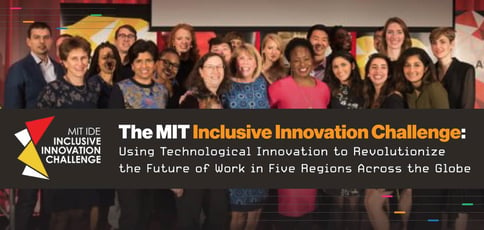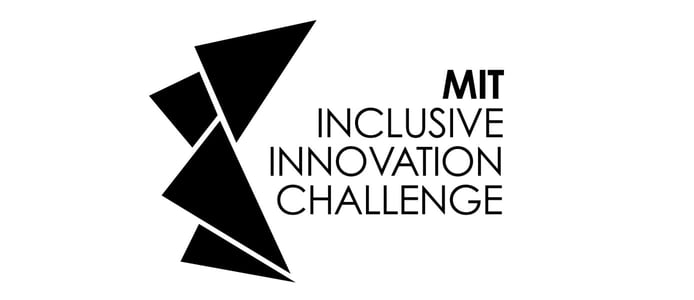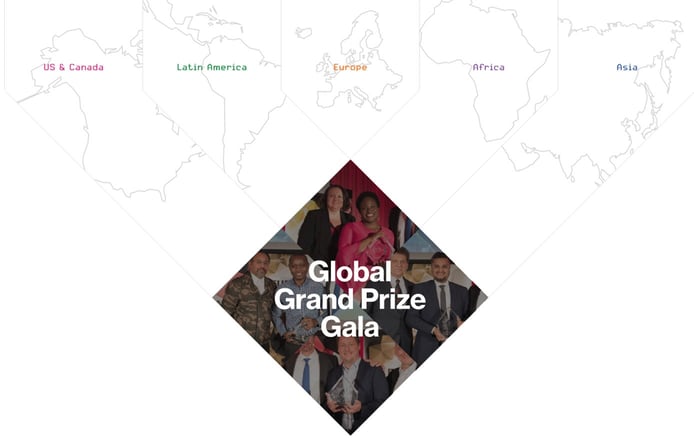
TL; DR: Each year, MIT distributes $1.6 million to the finalists of its Inclusive Innovation Challenge (IIC), a competition that awards entrepreneurs for creating economic opportunities in both developed and emerging markets across the globe. The private research university is addressing a moral and economic imperative to create greater shared prosperity and an economy that benefits all. With a focus on financial inclusion, income growth, job creation, skills development, opportunity matching, and technology access, the IIC aims to set a global example for the future of work.
The Supreme Court’s 1954 decision to desegregate schools in Brown v. Board of Education set a precedent that equal access to education is a right, not a privilege. Without it, we face nearly insurmountable barriers that prevent us from thriving in a number of areas.
Today, technology plays a similar role in opening the gates to economic wellbeing. An inclusive approach to innovation spurs financial growth and ultimately improves the state of humanity. But without such an approach, a significant portion of our population is effectively shut out from the benefits of technological progress.

The IIC tournament awards entrepreneurs across the globe who use technology to create economic growth.
“It’s become a human right to have access to technology because it is such a powerful lever to increase prosperity,” said Shannon Farrelly, Director, Communications & Media Relations at MIT’s Inclusive Innovation Challenge (IIC). “That’s why we have to make sure there’s equal opportunity.”
MIT is working to create that opportunity through the IIC, a tournament hosted by the school’s Initiative on the Digital Economy that identifies, promotes, and awards entrepreneurs in four categories and five regions for building solutions that encourage greater shared prosperity. Each year, the university hands out $1.6 million to regional winners in Africa, Asia, Europe, Latin America, and North America.
By rewarding those who use technology to drive economic growth for workers, MIT is helping even the playing field in terms of financial inclusion, income growth, job creation, skills development, opportunity matching, and technology access. Ultimately, the goal is to harness the power of technology in a future-of-work movement that benefits humanity as a whole.
Awarding $1.6M to Create Jobs and Economic Opportunity
The IIC is directed by Erik Brynjolfsson and Andrew McAfee, who are also the authors of “The Second Machine Age,” a New York Times bestseller that outlines strategies for prosperity in a digital era where technologies like artificial intelligence are bringing forth unprecedented change.
“Erik and Andy believe that, yes, technology is taking jobs, but it can also create jobs,” Shannon said. “We may be living in the most epic period of disruption in human history, but in this new era, we — not the machines — get to decide what technology can be used for.”
Through the IIC, MIT aims to ensure that technology is used for good. Specifically, the team is looking for entrepreneurs that are using it in a novel way to create financial growth for people around the globe, whether they’re factory workers in the Midwest whose jobs have been displaced by automation or those in the developing world who have never had access to technology in the first place.
To serve these diverse communities, participants in each of the five global regions in the IIC tournament compete in their respective areas, where local judges review them. The top 60 finalists in each region then move on to pitch their solutions to a live audience at a regional celebration.
From there, four winners are chosen from each of the five regional events. These 20 finalists then compete at the Global Grand Prize Gala, which will be held this year at MIT on November 21, 2019. There, the Global Champion Committee will select four Grand Prize Winners who receive $250,000 each.
A Moral and Economic Imperative to Accelerate Inclusive Innovation
In the face of tremendous progress, Shannon said it has never been more important to shape our economic future by tapping into entrepreneurial energy from across the globe.
“We feel that what we’re doing is some of the most important work that’s being done on the planet,” she said. “Machines are racing ahead, and no one can regulate or slow down innovation. But we must discover groundbreaking solutions to ensure we’re not progressing in a dark and negative direction.”
Instead of trying to bring jobs back from extinct industries, the IIC is leveraging emerging technologies to support a brighter future. Data from the inaugural 2016 event led the IIC team to define four primary ways that inclusive entrepreneurs accomplish their goals moving forward. Today, each applicant must fit into one of these established categories.

Each year, 20 Regional Winners gather at MIT, where four grand prize recipients are each awarded $250,000.
The first, Skills Development and Opportunity Matching, represents solutions that create pathways to new industries and jobs. The Income Growth and Job Creation category, on the other hand, includes innovators who are helping ensure workers earn incomes that are sufficient for achieving a satisfactory quality of life while reinventing struggling industries.
“These are organizations that are figuring out not only ways to create jobs for people — but jobs where they can grow and develop satisfying careers,” Shannon said.
The Technology Access category is centered on connecting people with the internet and other technology regardless of age, education level, ability, or location. Finally, Financial Inclusion represents innovators who work to ensure economic security and stability while providing access to the benefits of financial services.
“There are a huge number of unbanked people in the world, and we’re looking for ways to exchange a product or service for a currency without ever going through a bank,” Shannon said. “That’s a huge game-changer in the developing world, but it’s also needed here in the U.S.”
A Look at Regional Finalists and Winners of the Past
Since the IIC’s first hurrah in 2016, more than 3,000 organizations from over 100 nations have registered for the challenge. In that time, 100 global outreach partners, 500 judges, and 3,300 event attendees have helped the organization celebrate 100 winners, who have been awarded $3.5 million. As of October 2019, the ICC’s regional groups are celebrating in their respective areas before moving on to the Global Grand Prize Gala.
Shannon said last year’s entries included an interesting assortment of artificial intelligence solutions, such as Apli, a Latin American finalist in the Income Growth and Job Creation category. The app leverages AI-powered chatbots to create jobs by matching underemployed candidates to understaffed businesses.
“The app is extremely low bandwidth, so it’s accessible even to people using the most archaic cellphone in areas with limited tech access,” she said. “It’s designed to harness the genius of AI to match companies with workers, even if they don’t have a resumé or technological aptitude. It’s really opening up opportunities for people at the lower end of the economic spectrum.”
The 2018 Global Grand Prize winners were CareAcademy, an online professional development organization; Solar Freeze, a toolkit for local, off-the-grid food production; Wefarm, peer-to-peer knowledge sharing network for farmers without internet; and ftcash; a financial inclusion group that provides SMBs loans that can be paid digitally.
At the end of the day, Shannon said the $1.6 million that IIC awards annually is certainly significant to winners, but it’s nothing compared to the organization’s greater mission: to help them gain the valuable support of investors around the globe.
“What we’re doing is setting the example and spreading the word,” she said. “These businesses could be real money-makers for investors, but at the same time, they satisfy a moral imperative.”
HostingAdvice.com is a free online resource that offers valuable content and comparison services to users. To keep this resource 100% free, we receive compensation from many of the offers listed on the site. Along with key review factors, this compensation may impact how and where products appear across the site (including, for example, the order in which they appear). HostingAdvice.com does not include the entire universe of available offers. Editorial opinions expressed on the site are strictly our own and are not provided, endorsed, or approved by advertisers.
Our site is committed to publishing independent, accurate content guided by strict editorial guidelines. Before articles and reviews are published on our site, they undergo a thorough review process performed by a team of independent editors and subject-matter experts to ensure the content’s accuracy, timeliness, and impartiality. Our editorial team is separate and independent of our site’s advertisers, and the opinions they express on our site are their own. To read more about our team members and their editorial backgrounds, please visit our site’s About page.

